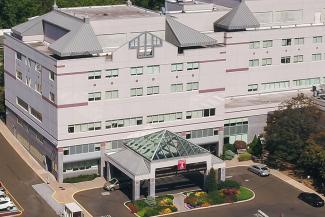For some neurological conditions, brain surgery is the best course of treatment. Surgery can remove tumors or other abnormalities, shrink tumors and lesions, and repair damage in the brain to provide relief.
Brain surgery is offered at Temple Neurosciences Center as a treatment for:
-
Benign and malignant brain tumors
-
Traumatic brain injury (TBI)
-
Trigeminal neuralgia (tic douloureux)
-
Vascular (blood vessel) disorders of the brain, such as aneurysms, arteriovenous (AVM) malformations, or cerebral cavernous malformations
-
Normal pressure hydrocephalus (NPH) or hydrocephalus
Specific brain surgery procedures offered at Temple Neurosciences Center include:
-
Awake brain surgery (awake craniotomy): This surgical procedure is performed while patients are awake and alert. Most often used to treat brain tumors and epilepsy occurring near parts of the brain that control movement, speech and vision, awake brain surgery allows the surgeon to interact with the patient during the procedure. He or she can ask questions and the patient’s monitor responses, ensuring that the correct area of the brain is treated and reducing risk of damage.
-
Deep brain stimulation (DBS) for Parkinson’s disease: Patients with Parkinson’s disease are often unable to regulate muscle movement, which can lead to tremors, trouble swallowing and difficulty walking. DBS stimulates the nerve centers that control these functions with an electrode placed deep in the brain by a neurosurgeon. That electrode is connected to a pacemaker-like device in the chest, and the device is programmed to reduce or even eliminate tremors and lack of control.
-
Stereotactic radiosurgery (SRS): SRS is used to treat deep-seated tumors, vascular malformations, lesions and functional disorders. It isn’t traditional surgery; there is no actual cutting, only precise targeting of the diseased area with highly focused beams of radiation guided by 3D imaging. Neurosurgeons and radiation oncologists work together to determine which of two SRS approaches is best for the patient: the Leksell Gamma Knife® 4C Therapy or the Elekta Synergy® Linear Accelerator Treatment. The radiation only affects the targeted tissue, leaving healthy tissue untouched.
Surgery can also be used to remove brain tumors and other abnormalities. Temple neurosurgeons have the capability to use intraoperative imaging during these procedures and others. The neurosurgeon uses the device to both take images that help plan brain surgery and take real-time images of the brain during the procedure. These real-time images are used to guide the surgeon when removing tumors or other abnormalities, giving him or her accurate information on whether the brain has shifted during the procedure and ensuring that tumors and other abnormalities are distinguished from normal brain tissue. This technique can help the surgeon remove tumors and other abnormalities more completely.
Experienced Neurosurgeons
The Neurosciences Center is a regional and national leader in neurosurgery, including brain surgery. Our board-certified neurosurgeons have the experience necessary to treat a wide variety of challenging neurological conditions using the latest treatment protocols and leading-edge technology.
Our multidisciplinary team works collaboratively, including meeting regularly for tumor boards, to diagnose patients and develop an individualized treatment plan tailored to each patient’s needs. Our specialists also participate in a wide range of clinical trials and research programs, including neurosurgical research in traumatic brain injury (TBI), stroke, and treatment of central nervous system tumors.
Our multidisciplinary team of specialists collaborates to specifically manage conditions that may require brain surgery. Our understanding of a wide array of complex neurological conditions will help patients receive the most appropriate and latest treatments.
Ready for an Appointment?
Find a doctor near you, request an appointment, or call 800-TEMPLE-MED (800-836-7536) today.

